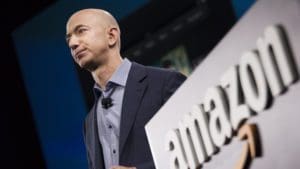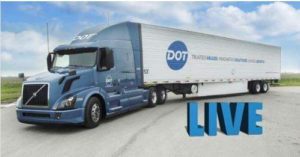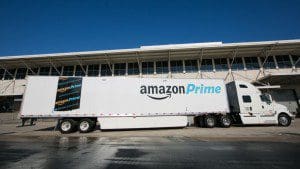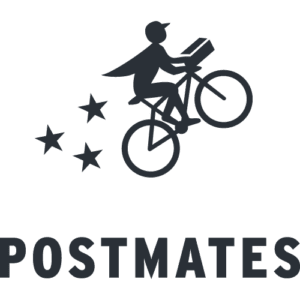 Earlier this week, it was reported that Jeff Bezos was the wealthiest human being of all time. Let that sink in – of all time. His reported net worth is upwards of $105 billion. Of course, that all has to be taken with a grain of salt. When factoring in inflation, Bill Gates has historically been worth more. In 1999, at the height of the dotcom boom, when Microsoft shares were at an astronomical high, Bill Gates was worth $100 billion. In adjusted terms, that is now equal to $150 billion. Either way, Bezos’ net worth has reached a number that is simply unfathomable to me, and everyone I know. And now, on to this week’s logistics news.
Earlier this week, it was reported that Jeff Bezos was the wealthiest human being of all time. Let that sink in – of all time. His reported net worth is upwards of $105 billion. Of course, that all has to be taken with a grain of salt. When factoring in inflation, Bill Gates has historically been worth more. In 1999, at the height of the dotcom boom, when Microsoft shares were at an astronomical high, Bill Gates was worth $100 billion. In adjusted terms, that is now equal to $150 billion. Either way, Bezos’ net worth has reached a number that is simply unfathomable to me, and everyone I know. And now, on to this week’s logistics news.
- Walmart to close 60+ Sam’s Club locations
- Dot Foods to host Facebook Live Q&A to attract drivers
- Amazon extends Prime benefits to Whole Foods items
- Target will wind down Instacart partnership as focuses on Shipt acquisition
- Sprouts teams up with Instacart
- Ford partners with Postmates
- Two-day shipping has helped double warehouse land prices
 With its acquisition strategy over the last few years, Walmart has shown that it is focused on building out its e-commerce footprint. To that end, the company is closing nearly 10 percent of its Sam’s Club location nationwide. According to Sam’s Club CEO John Furner, the company had built some clubs in locations that impacted other locations. The closures will ensure that Sam’s Club “rightsizes” its fleet. The company also said that possibly a dozen of the 60+ closing stores will be converted to e-commerce fulfillment centers. This is a move that should prove to be beneficial as Walmart continues to grow its online business.
With its acquisition strategy over the last few years, Walmart has shown that it is focused on building out its e-commerce footprint. To that end, the company is closing nearly 10 percent of its Sam’s Club location nationwide. According to Sam’s Club CEO John Furner, the company had built some clubs in locations that impacted other locations. The closures will ensure that Sam’s Club “rightsizes” its fleet. The company also said that possibly a dozen of the 60+ closing stores will be converted to e-commerce fulfillment centers. This is a move that should prove to be beneficial as Walmart continues to grow its online business.
 The truck driver shortage has been taking its toll on capacity and there are lots of questions about the future of trucking. The growing push for autonomous trucks has some people seeing a potential solution, although it is mostly likely a decade away, if not more. Recruitment of millennials and women has become more of a priority in recent months for many carriers. Dot Foods took a proactive approach to the problem by hosting a Q&A session on Facebook Live on Wednesday night. The end goal is to give potential drivers a real glimpse into the lifestyle and drive a number of new applicants. I haven’t seen any numbers on registrations yet, but will certainly be following up on this.
The truck driver shortage has been taking its toll on capacity and there are lots of questions about the future of trucking. The growing push for autonomous trucks has some people seeing a potential solution, although it is mostly likely a decade away, if not more. Recruitment of millennials and women has become more of a priority in recent months for many carriers. Dot Foods took a proactive approach to the problem by hosting a Q&A session on Facebook Live on Wednesday night. The end goal is to give potential drivers a real glimpse into the lifestyle and drive a number of new applicants. I haven’t seen any numbers on registrations yet, but will certainly be following up on this.
 Amazon is making its Prime membership more beneficial thanks to its purchase of Whole Foods last year. Aside from free two-day shipping on a large number of products sold on Amazon, plus free streaming of music and videos, the membership will now include free, same-day and one-day delivery on over 10,000 items, including those available at Whole Foods. Customers can now buy select Whole Foods 365 brand products, meat, and alcohol with a 2-hour delivery service offered to Prime members. This is all dependent on a qualifying purchase minimum of $35 or more, and the service being available in your area.
Amazon is making its Prime membership more beneficial thanks to its purchase of Whole Foods last year. Aside from free two-day shipping on a large number of products sold on Amazon, plus free streaming of music and videos, the membership will now include free, same-day and one-day delivery on over 10,000 items, including those available at Whole Foods. Customers can now buy select Whole Foods 365 brand products, meat, and alcohol with a 2-hour delivery service offered to Prime members. This is all dependent on a qualifying purchase minimum of $35 or more, and the service being available in your area.
 As I mentioned in my article on crowdsourced home delivery services earlier this week, Target will wind down its partnership with Instacart to focus on its acquisition of Shipt. Late last year, Target came to terms on a $550 million acquisition of Shipt to speed up same day home delivery service. As a result, Target is slowly dissolving its partnership with Instacart. The good news for Instacart here is that it only had delivery services for three of Target’s more than 150 markets. Target will begin offering same-day delivery of groceries, household essentials, home goods, and electronics through Shipt in the coming months. It plans to have the service up and running from half of its 1,800 stores by this summer and from most of its stores by next winter.
As I mentioned in my article on crowdsourced home delivery services earlier this week, Target will wind down its partnership with Instacart to focus on its acquisition of Shipt. Late last year, Target came to terms on a $550 million acquisition of Shipt to speed up same day home delivery service. As a result, Target is slowly dissolving its partnership with Instacart. The good news for Instacart here is that it only had delivery services for three of Target’s more than 150 markets. Target will begin offering same-day delivery of groceries, household essentials, home goods, and electronics through Shipt in the coming months. It plans to have the service up and running from half of its 1,800 stores by this summer and from most of its stores by next winter.
 Speaking of Instacart, the news is not all bad. In fact, the home delivery company announced that it is teaming up with both Sprouts and Albertsons to expand both companies’ delivery options. Sprouts is a prime competitor of Whole Foods, and considering Amazon’s acquisition of Whole Foods and the unknown future of Instacart in that chain, this is a good deal. However, Sprouts also has a deal in place with Amazon for Prime Now deliveries, so once again, the waters are muddied.
Speaking of Instacart, the news is not all bad. In fact, the home delivery company announced that it is teaming up with both Sprouts and Albertsons to expand both companies’ delivery options. Sprouts is a prime competitor of Whole Foods, and considering Amazon’s acquisition of Whole Foods and the unknown future of Instacart in that chain, this is a good deal. However, Sprouts also has a deal in place with Amazon for Prime Now deliveries, so once again, the waters are muddied.
 Ford is no stranger to testing self-driving deliveries (or at least the idea of them). On Tuesday, the company outlined a plan to partner with Postmates for autonomous delivery services. Postmates uses crowdsourced delivery methods to deliver restaurant meals, groceries, and alcohol (to those above the legal drinking age). As Ford moves toward a global repositioning as a mobility company, this is one of their key moves. The companies will conduct pilot services throughout the year to evaluate the utility of self-driving technology.
Ford is no stranger to testing self-driving deliveries (or at least the idea of them). On Tuesday, the company outlined a plan to partner with Postmates for autonomous delivery services. Postmates uses crowdsourced delivery methods to deliver restaurant meals, groceries, and alcohol (to those above the legal drinking age). As Ford moves toward a global repositioning as a mobility company, this is one of their key moves. The companies will conduct pilot services throughout the year to evaluate the utility of self-driving technology.
And finally, the e-commerce boom is driving up the price of warehouse space significantly. This should not come as a surprise, but just how much, might be. According to data from real estate firm CBRE, the average cost of land for large warehouses has doubled over the last year, to over $100,000 an acre, from about $50,000 in 2016. On top of that, the cost for smaller warehouses in or near major cities, which are generally used for last mile deliveries, has risen more than $250,000 an acre, up 25 percent from 2016 to 2017.
That’s all for this week. Enjoy the weekend and the song of the week, For the Love of Money, by the O’Jays.
https://www.youtube.com/watch?v=zcrppevM46Q

















Leave a Reply